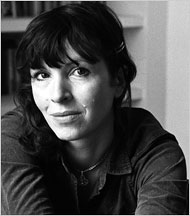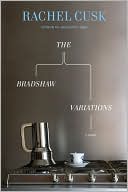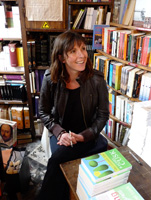Rachel Cusk recently took up the spurious question “Can creative writing ever be taught?” in an article in the Guardian. Rather than defend the practice, Cusk preferred to expose the motive of the “apparently well-meaning” questioner. She wrote, “It strikes me that people really ask the question out of a need to refer to their own lost creativity … It reminds them that they used to possess something that doesn’t seem to belong to them anymore. The creativity of childhood was often surrendered amid feelings of unworthiness. So the idea that others are demanding to be given it back – to be ‘taught’ – is disturbing.”
 This tactic – to tweeze what she perceives as the knotted impulses of others – must be instinctive for Cusk. In her absorbing seventh novel, The Bradshaw Variations, her narrator limns the inner scripts of the extended Bradshaw family. The narrative orbits around 41-year old Thomas Bradshaw and his wife Tonie; he has left his office job while she has branched off from full-time motherhood to become head of her college’s English department. There is Thomas’ older entrepreneurial brother Howard and family, younger brother Leo, and the Bradshaw parents. Cusk’s narrator also nibbles at Olga, a lodger from Poland staying with Thomas and Tonie, and Alexa, their schoolgirl daughter. There is a swirl of auxiliary characters as well – academics, Thomas’ piano teacher, Olga’s boyfriend, Alexa’s schoolmates, people on buses and the underground, Howard’s dog Skittle.
This tactic – to tweeze what she perceives as the knotted impulses of others – must be instinctive for Cusk. In her absorbing seventh novel, The Bradshaw Variations, her narrator limns the inner scripts of the extended Bradshaw family. The narrative orbits around 41-year old Thomas Bradshaw and his wife Tonie; he has left his office job while she has branched off from full-time motherhood to become head of her college’s English department. There is Thomas’ older entrepreneurial brother Howard and family, younger brother Leo, and the Bradshaw parents. Cusk’s narrator also nibbles at Olga, a lodger from Poland staying with Thomas and Tonie, and Alexa, their schoolgirl daughter. There is a swirl of auxiliary characters as well – academics, Thomas’ piano teacher, Olga’s boyfriend, Alexa’s schoolmates, people on buses and the underground, Howard’s dog Skittle.
Cusk’s prose balances precariously between drilling and droning sounds, catch and release, the sentences soldiering on in lockstep. The danger of monotony is obviated by the tartness of comment and observation. Early in the story, Tonie travels alone to a conference. In the following scene, she is in her hotel room. The speaker says:
“There is a restaurant downstairs. Tonie prepares herself in front of the mirror, trying on a different shirt. Who is she? What is she doing here in this room, with its sinister flowers, with its white shutters and wind and darkness seem to be trying tip rise open? Her own body, the unit of herself, so sealed and single: it is all she is, and yet she lives in it so little. Away from home, she is only this unit of flesh. What experience can she offer herself? What physical event will justify this form and bring it into knowledge? Alone, she eats a plate of fish and drinks a glass of cold yellow wine. The waiter is young, attentive, so formal that she becomes awkward and strange when he approaches. She has brought her notes down with her and she finds herself looking at them, looking at what she wrote down at the kitchen table last night in Montague Street, when she sat and thought of her trip, imagined the great inviting sea of the unknown and herself plunging bodily into it. Now she doesn’t know what it was she thought she would find here. She notices a stain on one of the pages: it is gravy, from last night’s chicken pie. She looks at other people talking, eating, in the fashionable room.
“Upstairs she phones Thomas. He is distant-sounding, slightly curt. He doesn’t know that there is anything in her plight he ought to be moved by. And she can never explain it to him, for as a story it revolves around the disclosure of a desire for something that has no name and is itself nameless, that she could arrive at only by a path of negatives that would somehow along the line have to pass through Thomas himself. But he doesn’t enquire …”
 Backhandedly complimenting Cusk, Curtis Sittenfeld writes in the New York Times Book Review, “Cusk is talented enough to persuasively inhabit all these points of view.” But “inhabiting” a character is something that Sittenfeld does in a book like American Wife, pretending to channel the mind of a First Lady modeled on Laura Bush (as laid out for her in Ann Gerhart’s biography). Cusk doesn’t inhabit characters. The cardiac rhythm of her prose, the alternating caustic and empathetic tone, and the avidity for describing the corresponding shifts in her characters’ perceptions all combine to create the novel’s true marvel – the narrator.
Backhandedly complimenting Cusk, Curtis Sittenfeld writes in the New York Times Book Review, “Cusk is talented enough to persuasively inhabit all these points of view.” But “inhabiting” a character is something that Sittenfeld does in a book like American Wife, pretending to channel the mind of a First Lady modeled on Laura Bush (as laid out for her in Ann Gerhart’s biography). Cusk doesn’t inhabit characters. The cardiac rhythm of her prose, the alternating caustic and empathetic tone, and the avidity for describing the corresponding shifts in her characters’ perceptions all combine to create the novel’s true marvel – the narrator.
Tonie’s dilemma is condensed in one phrase: “’I want attention,’ she says. ‘I don’t know why.’” Cusk’s narrator is the one who gives attention and enables the reader to be an equivalent observer. But the London world of The Bradshaw Variations is one where freedom slides into blockage or, as psychologist Adam Phillips has stated it elsewhere, where the wish for meaning degrades into a will to meaning.
Here is Thomas, who now stays home to get Alexa off to school and then practices piano:
“The truth is that for the past week Thomas has worked on the adagio like a solitary prisoner tunneling under the fortress walls. He is slightly ashamed of it, his secret determination, the rigidity of his methods, the insistent repetitive labour he has put into it, for this is how he has always got the things he wanted in life, and how he has got the better of what he didn’t want to do.”
Reading lines like these, which also tunnel through layers of psychological response and are animated by the feel of lived life, I suddenly recognize the turn of Thomas’ mind as my own. It’s familiar yet entirely original and unexpected. But I’m actually responding to – and aspiring to be the worthy companion of – this sometimes scornful but always acutely perceptive narrator.
No matter, Sittenfeld concludes that “the cumulative effect is surprisingly muted. The further the book progresses, the more arbitrary Cusk’s choices seem … Cusk’s tendency is to jump away from the suspense of the moment and return to it after the drama has been resolved … At times Cusk analyzes social undercurrents to the point of senselessness.” That Sittenfeld writes bland and pretentious books doesn’t bother me – she has her market. But it aggravates me that the NYTBR would put Cusk’s novel in the hands of such an unresponsive, conventional reader. I can’t say what sort of “cumulative effect” or handling of suspense she requires, but to ignore or simply not perceive the effects that do accumulate makes for vacuous commentary.
And this novel’s effects are profound. Cusk’s discursive, vaulting techniques are integrated by tonal control and a taste for freshly sprouted anxiety. Furthermore, The Bradshaw Variations is suspenseful throughout. Pressures build, bonds are strained, ordinary encounters yield small terrors. I’m reminded again of Phillips who writes, “Either we are suffering from whatever it is that sabotages our intimacies, or we are suffering from the notions of intimacy that we have inherited. It is not clear whether better relationships are the solution to our suffering, or whether it is that very aspiration that we suffer from.”
 Cusk’s fiction brings such psychological insights to situation, character, and the environments in which actions occur. In her essay on creative writing instruction, she describes an exercise given to her students as “a regression to the first encounter with language, a chance to reconfigure the link between the mellifluity of self and the concreteness of utterance. It felt as though this was a good thing for even the most accomplished writer to do. Were the students learning anything? I suppose not exactly. I’d prefer to think of it as relearning. Relearning how to write; remembering how.” The Bradshaw Variations has that mellifluity and concreteness – and gives us a rare chance to relearn by listening to the bitter, desirous language of the ordinary tumults of the mind.
Cusk’s fiction brings such psychological insights to situation, character, and the environments in which actions occur. In her essay on creative writing instruction, she describes an exercise given to her students as “a regression to the first encounter with language, a chance to reconfigure the link between the mellifluity of self and the concreteness of utterance. It felt as though this was a good thing for even the most accomplished writer to do. Were the students learning anything? I suppose not exactly. I’d prefer to think of it as relearning. Relearning how to write; remembering how.” The Bradshaw Variations has that mellifluity and concreteness – and gives us a rare chance to relearn by listening to the bitter, desirous language of the ordinary tumults of the mind.
[Published by Farrar, Straus & Giroux on April 1, 2010. 234 pages, $25.00 hardcover]
review of Rachel Cusk’s novel
I take a lot of pleasure out of what you say here because the Sittenfeld review in last Sunday’s Times just doesn’t reflect what Cusk does in her novel. But I believe this isn’t Sittenfeld’s fault. It’s the fault of the fiction book review editor at the paper. You can’t tell from most of their reviews what the standards of the reviewer are. Too many reviews just reveal the plot. Bradshaw Variations deserves a real critic not a novelist who writes in a much less exacting manner. Also, I’d like to recommend Cusk’s memoir A Life’s Work and her recent novel Arlington Park.
Adam Phillips
In which essay does the Phillips quotation about inherited notions of intimacy appear? I have several of his collections but haven’t read all the pieces, and I’d like to read this statement in context.
Thank you – and especially for your excellent critical review here.
The Phillips Quotations
The longer quote is taken from his essay “Narcissism, For and Against” which is included in his collections PROMISES, PROMISES. The shorter quotation is a version of the following from “Poetry and Psychoanalysis” in the same essay collection: “In psychoanalysis there is always the risk that the wish for meaning will be usurped by the will to meaning.”